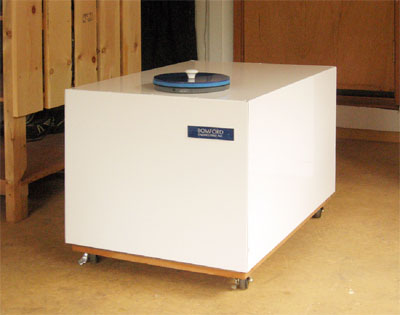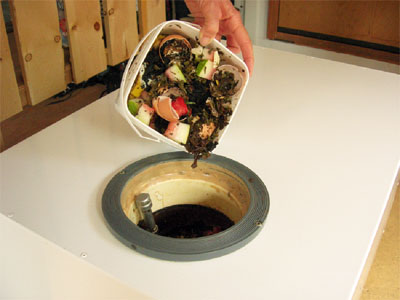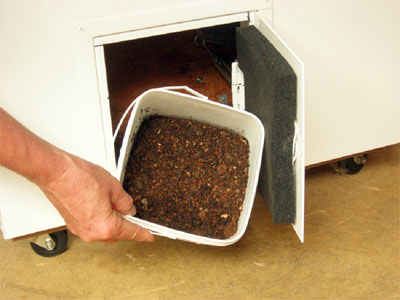Organic Solid Waste Onsite-Processing Technology
Joint-Venture Technology Brief
Contact: Jim Bomford
Business Opportunity: This new technology creates business opportunities in manufacturing, and the emerging markets for organic waste disposal, wood waste utilization and alternate energy production. Mr. Jim Bomford, P. Eng. is seeking to joint venture the commercial development of the technology by entering into an equity relationship with an existing business with a proven track record.

Bench scale prototype (photo above)
Industry Overview: By necessity, the market for waste disposal is fully serviced, typically by the trucking/landfill industry. Most industry-run organic waste processing operations are large centralized composting facilities that have had limited economic success due to high capital and operating costs, coupled with unacceptable environmental problems. However, the attitudes, economics and technologies associated with resource use and disposal are shifting as a consequence of increasing energy costs and a growing awareness of the need for environmentally appropriate, sustainable technologies. The application of science to the field of composting is thereby tied not only to waste disposal but also to a host of initiatives directed at energy conservation, alternate energy production, resource recovery and greenhouse gas reduction.
Target Market: This particular technology targets those segments of the waste disposal market that can benefit most from having their waste processed and utilized as close to home as possible. Two potential sub-segments stand out within this market, one includes institutional, commercial and industrial (ICI) establishments and one is from private residences. ICI waste generators include operations such as cruise and naval ships, armed forces bases, construction camps, resorts, prisons, sewage treatment plants, industrial food processors, agricultural operations and research laboratories. The residential market would be for domestic food waste disposal and composting toilets.

Adding Waste (photo above)
Competitive Advantages: These installations are compact and automated, occupying a small footprint without the need for shredders, mixers or other materials handling equipment other than would be necessary to deposit waste in a hopper and remove compost. The storage and transport of raw organic waste is eliminated. The equipment can operate in any climate without the environmental problems inherent in competing technologies. Processing can often take place within the area presently used to store waste prior to it being picked up for off-site disposal. Equipment electrical inputs are low and in all but the smallest units heat recovery can provide a net gain in energy. Combined capital and operating costs are expected to be competitive with existing truck and dump disposal costs.
Scientific / Technical Merits: The technology is designed to safely and efficiently process organic solid wastes at their point of origin through the use of an in-vessel, heat generating, aerobic biological composting process. Individual units can be constructed to process a wide range of organic wastes with processing capacities ranging from one kilogram to several tonnes per day. Installations target the disposal of putrescent, moist materials, which can be stabilized through the combined activity of biological decomposition and bio-drying such as food service residuals, food processing wastes, agricultural wastes, and sewage sludge. Computerized process control is provided to optimize mixing, oxygenation and moisture levels. The processing is completely contained in order to ameliorate problems associated with odour, leachate, rodents, insects, pathogens, exhaust gases and condensate. The process also utilizes and incorporates into the finished product, wood, straw or similar carbon based wastes, preferably in a dry pelletized form. The final product is a biologically stable, pathogen and odour free soil amendment weighing less than fifty percent of the original waste.

Finished Compost (photo above)
Development Status: Initial product development, proof of concept and performance testing has been carried out. A demonstration prototype at the scale of a residential appliance is in operation and photos of this unit are shown on the following page. A marketing plan is required to identify both the most appropriate entry point into the market and to provide a focus for future engineering design and refined benefit/cost projections. A Canadian patent application has been filed.
Inquiries: Please direct all inquires to Mr. Jim Bomford, P. Eng via e-mail at: jimbomford@shaw.ca or by telephone at 250-710-0286.
Search Our Site
![[new]](new01.gif)
